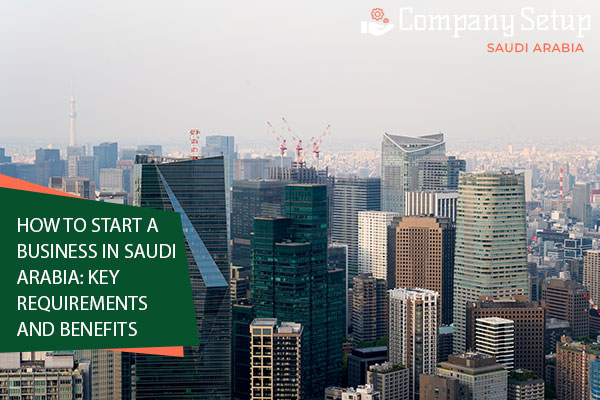How to Start a Business in Saudi Arabia: Key Requirements and Benefits

With the right paperwork and a formal company registration process, you can Business Setup in Saudi Arabia whether you’re a resident or an expat with a SAGIA and business licence. You have to follow some more processes, which might be a bit difficult.
For this reason, BMS Auditing walks you through each step in this post to help you launch a business in Saudi Arabia and set it up with ease using our business setup services.
Saudi Arabia, the world’s largest oil exporter, has developed into a hub for worldwide trade. Since then, the nation’s industrial portfolio has expanded to include communications, electricity, healthcare, tourism, hospitality, and other industries.
At the moment, the nation is more intent on growing its economy and drawing in outside capital. The establishment of small and medium-sized enterprises, and foreign investment in forward-thinking industries. It is a fusion of the Saudi economy with the international business community that is given top priority under the Saudi Vision 2030 growth strategy.
The following are the main benefits of Business Setup in Saudi Arabia :
Tax benefits
Make sure it works for you when you move or launch a firm in a new area. For many other entrepreneurs, this also includes making sure taxes are as low as possible. Here, Saudi Arabia comes out on top. The minimal personal income tax liability for foreign investors is 15% of company tax. The majority of goods and services are still free from Saudi Arabia’s VAT, hence zero rates apply to them.
Welcoming Environment
Saudi Arabia is currently welcoming the globe with broad open arms. The leaders of the nation are dedicated to embracing international visitors and investments to create a varied future for the Kingdom. Due to their reputation for friendliness, Saudi Arabians are a popular destination for international investors.
Innovation
Saudi Arabia strives to establish itself as the future hub of global technology. To do this, a series of billion-dollar projects were started, increasing the tech industry’s GDP contribution by over AED 50 billion, resulting in a 50% growth in the market sector and the creation of over 25,000 employment.
Similar innovation was brought about in the kingdom as a result of the investment in the technology industry, offering entrepreneurs exciting chances. Therefore, if you want to share some fantastic business ideas, you’re at the perfect place!
Wider Economy
Saudi Arabia, like the United Arab Emirates, is eager to move its economy away from oil and gas. The monarchs of the kingdom made enormous offers to companies in a variety of sectors to foster a broad, robust, and safe economy. Financial services, medicines, tourism, and technology manufacturing were among the rising industries.
Whatever your sector, Saudi Arabia supports you if you help the country’s economy grow by providing a conducive business climate.
The Requirements For Starting A Business In Saudi Arabia

Depending on your nationality and type of business, there are several prerequisites for establishing a company in RHQ Saudi. This is a broad summary:
Nationality: In some industries, foreigners are allowed to fully own enterprises. Nonetheless, certain industries could need a Saudi partner locally.
Business Form: Select a legal form such as a sole proprietorship or limited liability company (LLC).
Investment License: Obtain a license from the Saudi General Investment Authority (SAGIA).
Minimum Capital: The amount of capital needed varies based on the type of business and how it is organised.
Documents Needed for Pre-Setup Stage in Saudi Arabia
You must first obtain and prepare the necessary parent company-related paperwork for Saudi Arabian notarization and legalisation. The foundation of your company formation will be these documents.
Parent Company’s Memorandum and Articles of Association: This document describes the goals, organisation, and policies of your business.
Business License: The formal document that grants your firm permission to operate in its native nation.
Certificate of Incorporation: This document demonstrates that your firm is legally recognised in its place of origin.
Board Resolution: The official decision to open a branch or subsidiary in Saudi Arabia made by the board of directors of your firm.
Power of Attorney: This gives a representative the legal right to act in Saudi Arabia on your company’s behalf.
Business Incorporation Stage
After laying the foundation, the next step is to formally incorporate your company in RHQ Saudi. This is an important phase since it moves your company from a state of planning to real operating inside the Kingdom.
Acquire an Investment License from MISA: This license is required for international investors and is issued by the Ministry of Investment Saudi Arabia (MISA). This licence enables your business to conduct lawful business within the nation.
Notarise the Articles of Association: To verify the legal framework and operational policies of your business. The Articles of Association need to be notarized.
Send Out Your Business Registration Form: In Saudi Arabia, your business’s identification number denotes formal recognition and is known as the Commercial Registration (CR).
Register Your firm’s National Address: To ensure that all official correspondence is directed appropriately, it is required that your firm register its address with the Saudi Arabian authorities.
Register With The Relevant Government Agencies: To pay taxes, obtain insurance, and hire staff, your business has to be registered with many government agencies. This stage guarantees that your company complies with all applicable regulations.
Create Your Corporate Bank Account: In Saudi Arabia, you must lastly create a corporate bank account. All financial transactions about your business operations within the Kingdom will be made using this account.
Importance of Industry Selection and Understanding Market Dynamics
Succeeding in the Saudi market requires selecting the appropriate industry. An entrepreneur may make well-informed judgements and create a long-lasting company by having a thorough understanding of the industry-specific laws, demand, competition, and market dynamics. Crucial components of this stage include alignment with the nation’s Vision 2030, competitive analysis, and market research.
Conclusion
Establishing a business in Saudi Arabia is a thrilling and fruitful endeavour that blends a robust legal and regulatory environment with a thriving investment landscape.
The process entails careful planning and following regulations, including choosing the right industry, being aware of local corporate laws, getting the required permits, adhering to legal requirements, taking into account financial factors like taxes, protecting intellectual property rights, and performing extensive due diligence.
